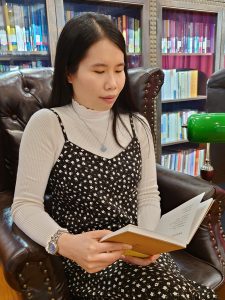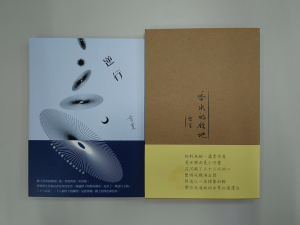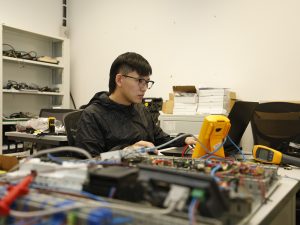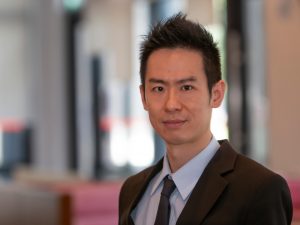During our studies or work, we are often distracted by the pop-up notifications on our mobile phones, which break our concentration and make it harder to complete the tasks at hand. In this issue of My UM, we have interviewed three University of Macau (UM) members on how they engage in deep work to improve concentration, which is the key to productivity in both study and work.
The Key to Productivity
In his book Deep Work, Cal Newport, associate professor of computer science at Georgetown University, defines deep work as putting concentration and effort into creating valuable outcomes. He contends that this is not only a rare skill, but also the key to success. Examples given in the book include Harry Potter author JK Rowling, who is known for disappearing from social media to focus on writing novels, despite using a computer to work, as well as Bill Gates, founder of Microsoft, who famously spends two weeks every year away from society in a cabin in the woods.
Pansy Lau, graduate of the Department of English of UM, who is also a Chinese-English translator and a passionate poet, once left her job to focus on finishing her first poetry collection, Leeway for the Fragrance. Lau admits that multitasking is a common requirement in todayʼs workplace, but it can have a negative impact on productivity. For example, outside disturbances such as mobile notifications can break her concentration while translating or writing. For this reason, she has a habit of putting her mobile phone on the desktop upside down, switching the phone to Do Not Disturb mode, and closing irrelevant web pages on the computer. ‘Of course, it can be exhausting to maintain such a high level of concentration, so I take a ten-minute break for every one to two hours of deep work,’ says Lau. ‘When people do everything with energy and composure, they are often deeply engaged in each moment and can get twice the result with half the effort.’
Focusing on One Task at a Time
Sou Wai Kit is a PhD student in UM’s Faculty of Science and Technology, with a focus on electrical and computer engineering. He began his PhD studies immediately after obtaining his bachelor’s degree from UM. In the past three years, Sou has published seven research articles in international journals (six were published in SCI-indexed journals with Q1 rating, which are among the top 25 per cent of journals in the world) and three articles at international conferences. In addition, he is the first author of five of these articles, three of which were published in Q1 journals. In 2021, his article titled ‘Design and Implementation of Current Control Strategies for LC-coupling Hybrid Active Power Filter’ placed first in a postgraduate paper competition organised by the Institute of Electrical and Electronics Engineers Macau IES Chapter.
‘Whether it is study or research, deep thinking and a high level of concentration are essential to achieving the best results,’ says Sou. To avoid distractions, he usually puts his mobile phone out of reach when he is thinking or studying. Sou adds that researchers often take advantage of deep work when investigating difficult problems, as they need to be fully focused on finding and analysing the piece of information required to understand the underlying cause of an issue or a phenomenon. ‘If you get distracted in the middle of this process, your stream of thoughts would be interrupted and your productivity would decrease, and it may take much longer to solve the problem,’ says Sou.
Suggestions for Deep Work
Matthew Liu is the director of UM’s Centre for Continuing Education and professor of marketing in the Faculty of Business Administration. Specialising in marketing, brand building, corporate governance, and strategic planning, he has published over 100 articles in academic journals in both Chinese and English as well as at academic conferences. He has also written over 700 business diagnostic articles and columns, and has served on the Macao SAR governmentʼs economic development committee and as an independent director of a listed company in Hong Kong. With an exceptionally busy schedule involving teaching, research, and administration, Prof Liu has worked tirelessly to maintain a steady output for over ten years. To learn from his extensive experience of deep work, we interviewed him and he shared information about two modes of work, one of which involves basic concentration skills while the other incorporates advanced skills.
In the basic mode of deep work, the first thing to keep in mind is to do a fixed amount of work in a fixed amount of time. For example, Prof Liu regularly meets with colleagues and students on Wednesday afternoons, reads academic papers on Thursday afternoons, works out at a moderate to high intensity three times a week, and follows a regular sleep schedule. ‘I try not to let other things get in the way or change arrangements in order to keep things on schedule,’ says Prof Liu. The second thing is to do the difficult tasks first, and then the easy ones later. ‘Many people are used to starting simple, which makes it harder to get things done because the difficult tasks are usually more time-consuming and require the most in-depth thinking. They also require more preparation in advance,’ says Prof Liu. The third strategy is to cut off all distractions while working. He suggests avoiding checking emails or mobile messages by setting phone devices to silent mode. ‘This is easier said than done because it requires both mental and physical discipline,’ he says.
If we accomplish these goals, Prof Liu says we will be ready to take on the advanced mode of deep work. There are also three steps to this process. First, we must leave our comfort zone. For example, if the goal is to be able to run a certain distance, we should set a target time and test our performance to see if we can improve. According to Prof Liu, it is the same with both study and work, if we only focus on the easy activities, we will lose the motivation to move forward. ‘We must always move on to the next hurdle step by step,’ says Prof Liu. Second, we should improve our concentration through trying different meditation methods. Third, we must learn to say ‘no’ to distractions. ‘Outside distractions trouble us because we donʼt know how to ditch them. Figuring out our priorities in life and work can help us engage in deep work,’ says Prof Liu. ‘We may also learn to use euphemisms to say “no” to them to give ourselves more time for things that are more important.’
According to Prof Liu, although multitasking is a crucial skill today and sometimes we need to deal with ten tasks at a time, this mode of work is not suited to everybody. ‘Prolonged periods of multitasking can lead to decision fatigue and reduced quality of decision making,’ says Prof Liu. ‘It may be manageable for short periods of time, but multitasking is not conducive to deep work and may damage physical and mental health in the long run. These are my experiences and I hope they will be of some help to the students in their studies.’
Source: My UM ISSUE 114






